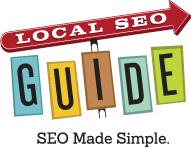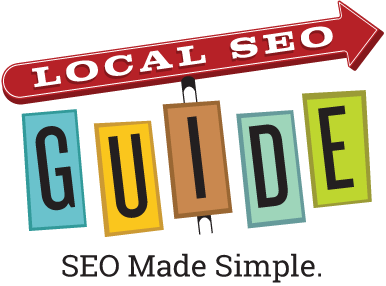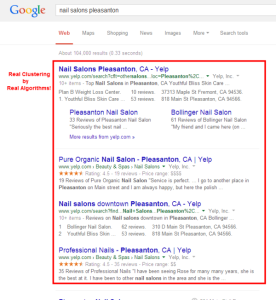This post was originally published on Search Engine Land, but I didn’t like how they rewrote the title so here’s the director’s cut:
To: Local Directories
From: Google
Re: Local Search Rankings
Hey guys… You may have noticed that over the past year, a lot of the organic traffic to your sites has been… well, we guess the right word is “tanking.”
As you know, it is our stated goal to organize the world’s information while simultaneously doing no evil. And, while you certainly have helped us manage the world’s information (thanks for adding schema to all your business listings and reviews so we could figure out how to beef up our Google+ Local listings!), we are starting to think that showing most of your sites in our SERPs just might be a tad evil.
We have told you over and over again that if your site is “good for users,” then you’ll show up in SERPs. But, if your site’s just a collection of a few million generic business records slapped on a state > city > category architecture — well, at least you have figured out your 2003 SEO strategy.
We know. You are busy selling digital marketing to SMBs and optimizing for AdSense (Larry says “thanks!” BTW) and haven’t had time to figure out the “good for users” thing. Since no one is using your site anymore, perhaps now you might have a bit more time?
You may have noticed we haven’t dinged all local directories. There are some out there that are thriving and in fact have increased their organic traffic, thanks to some clever algorithm updates — who doesn’t like four Yelp results in a row, right?
Perhaps you can learn from some examples what makes for a good user experience. After all, using other people’s content is what we do best, right?

Be Great At Telling Local Stories (Airbnb Infographics)
If you want to see a great example of using data to tell your story and attract links that have local rankings impact, look no further than Airbnb’sEconomic Impact infographic which illustrates the impact the service has had on nine cities around the world. The piece leads readers (and Googlebot) via text links to neighborhood pages like this one. This is not rocket science. Tell an interesting story in an interesting way, promote it, get links, and chances are you’ll start ranking on page one.
![]()
Know How To Write Quality And Quantity (Angie’s List Articles)
While Angie’s List has customer reviews like Yelp, Angie started out producing a monthly magazine to provide its members with home maintenance tips and profiles of local advertisers. After doing this for a few years, Angie and her crew were sitting on a gold mine of professionally produced editorial and started publishing it on their website. According to this search, they may have as many as 11,000 articles on their site by now, most of which are how-to and homeowner-tips type stuff relevant to their target customers.
While no single article is going to make or break a link building campaign, having a veritable library of content can both attract links and provide relevant info for anyone who clicks over to the site. So, your links help your rankings while your content helps engagement.
Angie’s List employs two different styles of content: meat-and-potatoes posts that target common, valuable queries (like this one that ranks high on page one for “new roof cost“) and posts that act as link magnets (like this awesome Do-It -Yourself Lego Wallpost).
![]()
Get People To Phone It In (Foursquare Check-Ins & Tips)
After Marissa blew the Yelp deal, we have found ourselves using Foursquare more and more. Foursquare is a great example of how a mobile-first strategy can benefit desktop SEO. Every time a user checks in or adds a tip, that content gets added to the business profile on Foursquare.com. There is almost nothing better than regularly updated profile pages to get these URLs ranking well. Do you have a good mobile app that people use to do stuff?

Get Businesses To Do Your Work For You (Merchant Circle)
When Yelp, Insider Pages and Judy’s Book were starting out chasing customer reviews, MerchantCircle took a different path and started chasing local businesses to add content and connect with each other on the site. While it became a bit of a spam magnet, it also became a powerful content generator as local marketers saw the benefit ofpublishing as much content as they could and reaping the Barnacle SEO benefits. What’s your strategy to engage your customers to contribute to your platform?
![]()
Create Your Own Annual Survey (Thumbtack Small Business Friendliness Survey)
We like to call Thumbtack the little directory that could. During the 2012 presidential election, Thumbtack partnered with the Kaufman Foundation to conduct a poll of local businesses, asking them how they felt about the economy.
They published the results for each major city and state in the country and then did some old-fashioned smiling and dialing to let business journalists covering the election know about it. This resulted in both national and local press coverage. The local press coverage was particularly effective in driving links to the city pages that contained the local survey results. They repeated the survey last year, and I wouldn’t be surprised if they do it again in 2014.

Be Yelp
An obvious one, but let’s face it, Yelp won round one of the local business reviews battle and all of the SEO spoils that come with it. What battle are you fighting, and what’s the SEO benefit of winning it?
At Least Start A Damn Blog Or Something!
Check out Mike Blumenthal’s Blog or Linda Buquet’s forum or Phil Rozek’s blog or anyone who has had to publish or perish. But those don’t scale, you say? Well then, how about The Dish or Daring Fireball — personal blogs that have exploded to thousands if not millions of users? These sites have single posts that get more organic traffic than most of the pages on your sites put together. We often see you guys starting blogs but never really committing to them. If you’re committed to SEO, you need to be committed to content.
Look, we know you got in this business because… well, we’re not sure why you got in this business, but to succeed in the local directory SEO game these days, the more you start to think like a content publisher first and a lead generator second, the better off you’ll be.
Disclosure: I did some SEO consulting for AngiesList and Thumbtack back in the day and I own a few shares of Airbnb stock. Go Airbnb!



4 Response Comments
A very very rich piece, Andrew….and you dang well should get the title you want.
The links you provide are quite revealing. thanks
As I said, Andrew, you should write a book and there’s no way back…
That intro section was EPIC!
That was a MONSTER post, Andrew…right up there with Mike Blumenthal’s “Train Wreck” post from late 2012! I’m still LOL! So much has changed in the last couple ‘a years and I don’t know how SMBs can stay abreast of it all!
Thanks Terry. The good news is SMBs don’t need to stay abreast of anything as rockstars like yourself are there to show them the way 🙂